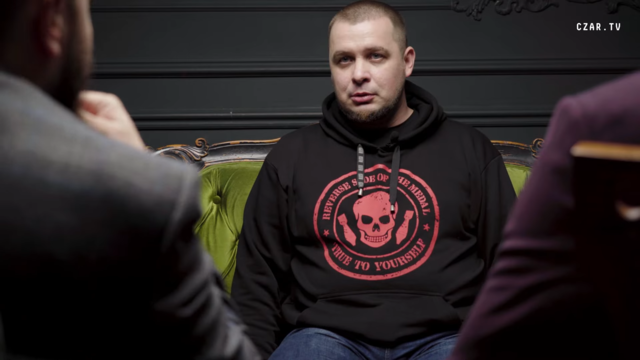Guilty Until Proven Innocent: Russia’s Top-Down Nationalism

Vladlen Tatarsky in 2021
Morgan Aikele– A recent cafe bombing in St. Petersburg left hawkish Russian military blogger Vladlen Tatarsky dead. Just one day after the event, a suspect, a young Russian woman, was detained. While arresting a person of interest in an alleged murder hardly seems out of line, Russian authorities are seizing the opportunity to employ top-down nationalism and respond more harshly to antiwar activism in Russia.
Nationalism refers to the shared sense of attachment that people have to a particular nation and emphasizes that every nation has a right to control a particular piece of territory. To state the obvious, Russia’s invasion of Ukraine has much to do with this sentiment (at least according to Putin, who argues that Ukraine was wrongfully taken from Russia following the dissolution of the Soviet Union). Top-down nationalismrefers to when official government resources, like state officials and media, seek to justify geopolitical actions by appealing to a sense of national identity. In this context, the motives for Russian authorities’ actions in the arrest of Daria Trepova, accused of the cafe bombing, become clearer. Law enforcement has focused on Trepova as having “opposition views” and has claimed that she worked with Ukraine to deliver explosives to Tatarsky. Subsequently, Russia’s Antiterrorism Committee issued an official statement, promoted as fact, that the cafe bombing had been planned by Ukrainian intelligence agencies. They also tied the bombing specifically to “agents” of Aleksei Navalny, the imprisoned Russian opposition leader. By publishing these statements so rapidly, and without any evidence, Russian authorities are capitalizing on an opportunity to promote fear not only of Ukraine, but of any Russian who participates in antiwar demonstrations in their own community. Instilling fear of antiwar activism means that the Kremlin may more easily and harshly punish those who dissent and stray from the message of top-down nationalism– and do so with a heightened sense of justification.
Understanding ideological power further illuminates our understanding of Russia’s actions. Ideological power speaks to the power that an actor, like a government, has to make others follow its agenda with unquestioning adherence. In this case, Russia could resort to physical violence to simply mow down antiwar demonstrations. However, to maintain public support for the war, creating fear and hatred towards dissidents, or those Russians who believe contrary to their government, may become increasingly prevalent.
Photo licensing: This file is licensed under the Creative Commons Attribution 3.0 Unported license.

